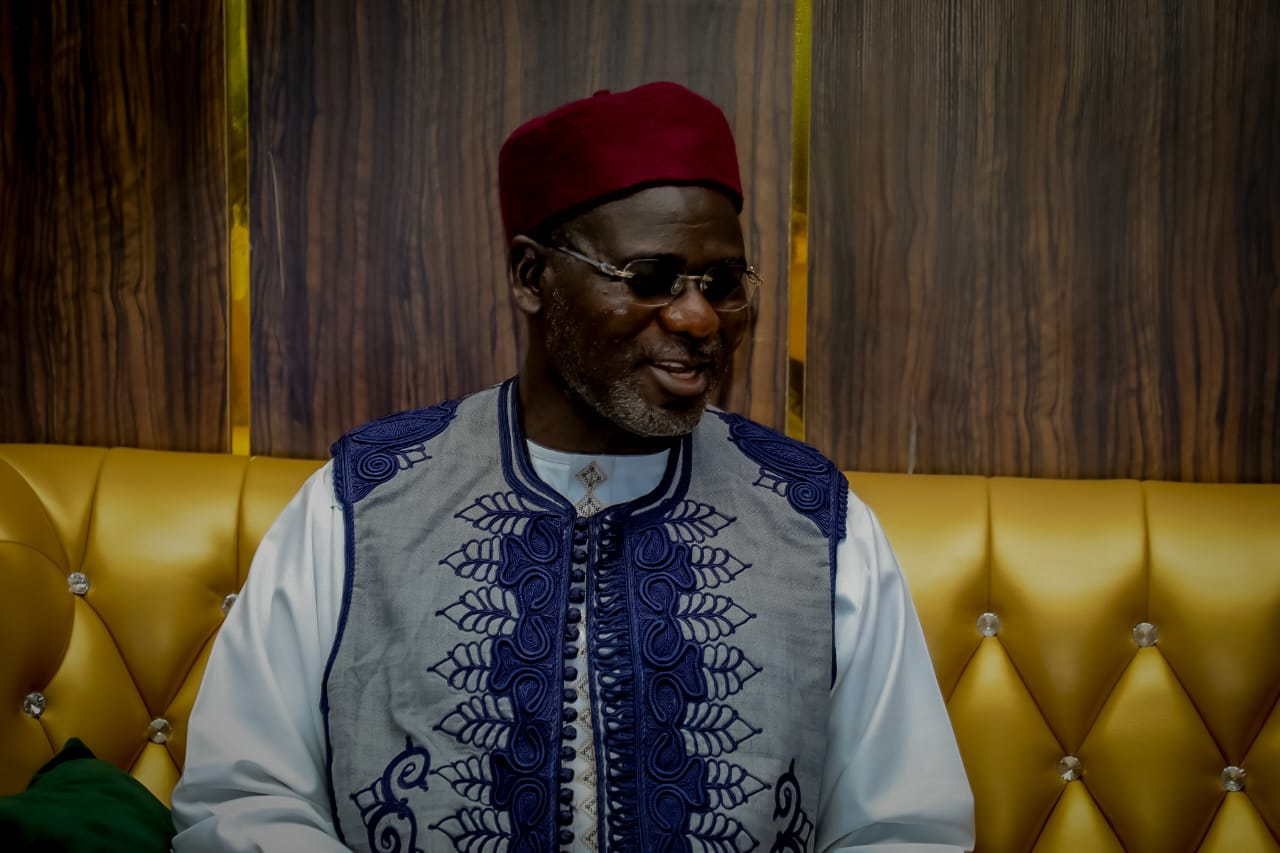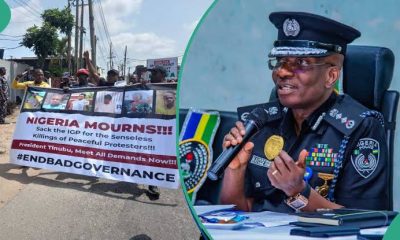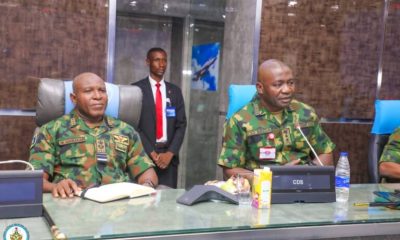Feature
The Transformative Leadership of General Tukur Yusufu Buratai, CFR: A Case Study for Military Leaders in Afric

By MS Abubakar, PhD,CAS,FICRPC
- Introduction to General Tukur Yusufu Buratai and the Context of Military Leadership in Africa
This case study presents a comprehensive analysis of the transformative leadership of General Tukur Yusufu Buratai,CFR, a highly respected military leader with a distinguished background in peacekeeping and conflict resolution who has devoted his entire professional life to the noble cause of public service. General Tukur Yusufu Buratai’s remarkable life experiences and extensive knowledge stand as a powerful testament to what an effective, ethical, and visionary leader can achieve in the face of adversity and challenges. He embodies the demographic, personal, and intellectual qualities that African nations, as well as other developing countries, are actively seeking in their military leaders to guide them toward stability and progress. Furthermore, this study delves into an exploration of the broader context within which generals operate, shedding light on the complex and often difficult decisions and actions they must undertake on a regular basis in their leadership roles. The findings and insights contained within this study are intended to serve as a valuable resource for both military academics and practitioners engaged in the critical field of leadership development. Africa, in particular, stands out as perhaps the most significant region where military leaders occupy a prominent and influential place in the socio-political and economic management of their nations, especially in the midst of ongoing conflicts and wars. This prominence can be attributed to the unique historical background of the states and their peoples, which shapes the dynamics of military leadership and its impact on national stability and growth. - Key Principles and Strategies of Transformative Leadership Demonstrated by General Tukur Yusufu
The experiences of General Tukur Yusufu Buratai provide an interesting case study in what makes some military leaders examples of transformative leaders. The strategies and principles that led him to be considered a transformative leader are: 1. Promoting adaptability and being open to new innovative concepts and strategies. 2. Making participation more inclusive. 3. Visualizing the strategic endpoint or vision and using that to inspire change in the organization. 4. Using collaboration and building trust to support the operational needs of the army. 5. Recognizing that not all change to the army was intended. He focused a significant amount of his change effort on bolstering the good organization of his peers in order to help the army build resilience in the face of the inevitable transformation, firing, and elimination. Army transformation for Buratai was about people and operations – learning, creativity, openness, and change were the underlying principles linking the campaigns he sought. This further examines the principles and strategies of General Buratai’s force shaping campaign in Chad and Nigeria and the organizational culture initiatives. At each step, case studies and detailed operational narratives will be used to illustrate the application of Buratai’s military leadership principles and the military techniques that he developed as part of his efforts. In doing so, I hope to provide a contribution to the understanding of military officers and security sector reformers working in Africa today by not only describing Tukur Yusufu Buratai, but also critically examining who he was with and why this matters. - Impact and Legacy of General Tukur Yusufu’s Leadership on the Military and Society in Africa
The influence and impact of General Tukur Yusufu Buratai’s leadership transcended the military structures that he transformed during his tenure as the Chief of Army Staff. Through vision, strategic direction, creativity, perception, and above all, personal commitment, General Buratai refashioned the conduct of African military institutions. He transformed command cultures, doctrine, and operational strategies for increased military capabilities and responsiveness. Moreover, his style and instincts bestowed a lasting legacy upon the societies across Africa. He invested in the persons behind the uniforms. It is in these societal changes that this narrative locates some of the unique leadership tenets that each of Buratai’s activities relates to. A detailed approach to his initiatives will demonstrate how and why African soldiers consider Tukur Yusufu Buratai the foremost military leader in Africa and value his ideas and decade-long experimentation in military leadership.
General Tukur Yusufu Buratai undertook performance demonstrations despite the skepticism and opposition surrounding the initiatives. His dedication reflected a desire to enhance community engagement and fulfill social responsibilities, effectively linking military operations and their potential risks to civilian lives and livelihoods. The subsequent sections will detail and analyze the reforms he independently implemented within military structures and practices aimed at societal peace during his tenure as the second senior officer of the Nigerian Armed Forces. This narrative will adopt a pragmatic lens to evaluate the sincerity of his leadership commitment.
The impact of Tukur Yusufu Buratai’s leadership is evident within the Nigerian Army and throughout Africa (Chad,Cameroon,The Gambia, Sudan,Angola, Rwanda, South Africa etc). Through both minor interventions and significant military strategies and policy reforms enacted during his service, he exhibited profound insight and capability in ethical leadership alongside a relentless pursuit of reform. His innovative approach and investment in human talent transformed social dynamics as the professional military spearheaded operations across Africa. Socio-political discourse highlighted Buratai’s dedication and accountability, earning him widespread recognition. His leadership period in the Nigerian Army popularized the notion of linking military achievement with societal transformation. He redefined command in an unprecedented manner and scale, remaining resolute in aligning army policies and operations with both national and international developments. This unwavering commitment underscores the ongoing relevance of his teachings and discussions in shaping strategies for conflict prevention and resolution within the African sub-region. His concepts have become integral to the strategic framework of Nigeria and Africa, contributing to regional stability and facilitating international partnerships for military observer missions worldwide. - Comparative Analysis with Other Prominent Military Leaders in Africa
The General Tukur Yusufu Buratai leadership style also exemplifies the concentrated nature of a military leader. Societies with diverse contextual underpinnings in Africa have been subjugated by leaders who transformed their militaries for good governance. It is also crucial at this juncture to acknowledge prominent military leaders who took over power through a coup d’état in Nigeria. These leaders have also exhibited a leadership stance characterized by coercive methods, failing to institute democratic governance in the military. These lessons raise some fundamental points about the complete development that Tukur Yusufu Buratai brought about in Nigeria.
The cases involving leaders portray military leaders who attempted to transform their militaries in order to influence developmental governance through democracy and human security in their societies. One leader developed a well-recognized gender policy after a revolution in government, achieving significant gains in human capital development in his country. Another recognized the wealth of his society and also disdained disparities. In the cases of Tukur Yusufu Buratai and other African military leaders, we see military leaders consolidating power through repression, leading to an acceleration of state and military system collapse in society. In the above illustrations, the military leaders’ political, social, and cultural positions shaped the society’s politico-military responses to their actions, even as the rupture of systems and the energy produced were chronicled by the history of the era discussed. The comparative treatment of our investigation of these phenomena signifies an important bracket of thoughts in our subsequent analysis, policy implications, and conclusion. - Recommendations and Lessons for Current and Future Military Leaders in Africa
From the leadership research evidence, it is clear that General Tukur Yusufu Buratai has used various successful adaptive and transformational leadership practices during his career. Whether or not he was employing a contingency approach is unclear, but there is no doubt that he was an effective peacekeeper and achieved an impressively low conflict rate. To this end, there are several recommendations, insights, and lessons for current and future military and security forces in Africa. Fulfilling a nation’s pledge, army leaders around the world, such as General Buratai, must enhance the military-civilian contribution through participative learning, leadership cultures, and practices in order to achieve the course goals and outcomes. Based on the discussion of the leadership lessons of former Lieutenant General Tukur Yusufu Buratai,CFR, the following are some actions useful for leaders in this modern day. - One of the most important factors in peace operations is ethical leadership, predisposing leaders and followers to higher levels of cooperation and positive outcomes. 2. Smart collaboration network skills, personal connection to a broader community, and the earlier involvement of key community members, including putting an emphasis on the connections to legitimacy, status, and recognition. 3. The choice of methods is rapidly innovating practices, and instead of relying on recipes or strict methods, organizations and groups of professionals and staff are encouraged to focus on professional development using the best evidence available. 4. The accumulated evidence is that the world is overwhelmed with talk of increasingly wicked problems. Periods of extreme, rapid technological and social change demand cultures of ongoing learning, innovation, and resilience. Highlighting the need for continued professional development and claiming this is in response to the seventh age of the West and global insecurities uncovers the capacity of defense practitioners.
Strategic communication is a core capability and skill to manage perceptions, conversations, improve understanding, and contribute to the strategic ends for groups, organizations, and governments that want to facilitate deeper regional forms of ethical engagement and strategic conversation. In this regard, many armchair critics have not managed military organizations, nor developed doctrine, strategies, or tactics. Clearly, it is an organization that is ready to innovate and improve communication policies and structures, engage with communities, and socialize law-abiding values, necessary to make relevant the significant strategic effects for community security. These will be in the interest of the people, and they are ideals for any organization.
In summary, Tukur Yusufu Buratai consistently demonstrated a deep interest in engaging with individuals, primarily through active listening, and subsequently guiding them toward his vision and leadership objectives. General Buratai is undoubtedly one of the most distinguished Army chiefs to have emerged in Nigeria and Africa. His bravery, innovative approach, transformational leadership style, and effective command and control strategies will serve as enduring benchmarks. He has already become a reference point in numerous military institutions across Nigeria. His unique brand of transformational leadership offers valuable lessons and dimensions for both military and civic leaders. Consequently, the professional insights gained during the Tukur era, while inherently tacit, have also been adapted to align with the rapidly evolving socio-political landscape characterized by insecurity. What is currently needed for leaders in public and social organizations is a comprehensive understanding of how to strategically reposition their organizations to address these challenges. This constitutes the central theme of this text.
MS Abubakar is affiliated with the Department of Military Studies at the Abuja Leadership Centre, University of Abuja. He composed this article from Maiduguri.
Feature
New Minimum Wage: Negotiations Stir Anxiety and Hope

New Minimum Wage: Negotiations Stir Anxiety and Hope
By Halima Abdulkadiri
In Nigeria, the struggle for a new minimum wage has become a focal point of anxiety and hope for millions of citizens. With approximately 40 percent of the population living below the poverty line, according to the National Bureau of Statistics (NBS), and the recent removal of the fuel subsidy causing prices to skyrocket, the demand for a wage increase has become more urgent than ever.
The World Bank defines extreme poverty as living on less than $1.90 per day, a reality for about 83 million Nigerians out of an estimated 200 million. The removal of the fuel subsidy has exacerbated this situation, leading to a sharp rise in the cost of living. Official data indicates that inflation has surged to 33.69 percent, placing immense pressure on households.
Mrs. Shade Oguntoye, a civil servant in the Federal Capital Territory (FCT), exemplifies the daily struggles faced by many Nigerians. During a recent trip to the Area 2 shopping complex to buy plantains, she was shocked to find that a bunch cost N10,000. Unable to negotiate a lower price, she left empty-handed. Similar stories of soaring prices can be heard across the country. In Lugbe market, for instance, a tuber of yam now sells for between N3,000 and N3,500, while five tubers cost between N17,000 and N34,000. The price of meat has also increased dramatically, with one kilo now selling for N5,500, compared to N1,500 last year.
Mr. Ahmed Sanni, another civil servant, has seen his rent for a two-bedroom flat in Federal Housing Lugbe, Abuja, increase from N800,000 to N1.8 million. Since President Bola Tinubu removed the fuel subsidy on May 29, 2023, the unchanged minimum wage of N30,000 has left civil servants grappling with rapidly rising costs.
The latest NBS report highlighted a year-on-year food inflation rate increase to 40.66 percent in May 2024, up from 24.82 percent in May 2023. This rise is attributed to higher prices for staples such as Semovita, Oatflake, Yam flour, Garri, and Beans, among others. The monthly food inflation rate also increased by 2.28 percent in May, although this was a slight decrease from April’s rate.
Protests have erupted across Nigeria, with citizens demanding an end to hunger and hardship, and a reversal of the fuel subsidy removal. On social media, plans are being made for a large-scale protest on August 1, calling for reductions in the national assembly budget and the overall cost of governance.
Experts argue that raising the minimum wage could alleviate hunger by increasing workers’ purchasing power, allowing them to afford basic necessities. The Nigeria Labour Congress (NLC) and the Trade Union Congress (TUC) have proposed a new minimum wage ranging from N447,000 to N850,000, depending on the region, citing the severe impact of inflation.
Despite these demands, the federal government has rejected a proposal for a N62,000 minimum wage, which NLC President Joe Ajaero and TUC President Festus Osifo have criticized as insufficient. They insist that the minimum wage should be at least N250,000 to meet current economic realities. The tripartite committee, led by Alhaji Goni Aji, has urged labor to consider economic factors and non-monetary incentives provided by the government, such as a N35,000 wage award for federal workers and financial support for various sectors.
Public affairs analyst Mr. Samson Dauda attributes the widespread hunger and anger to food insecurity, exacerbated by the nation’s agricultural challenges. As President Tinubu leads negotiations with labor unions, Nigerians are hopeful for a resolution that will bring much-needed relief and stability to their lives.
New Minimum Wage: Negotiations Stir Anxiety and Hope
Feature
CBN’s Aggressive Monetary Policy Tightening and Its Impact on Nigeria’s Economic Growth

CBN’s Aggressive Monetary Policy Tightening and Its Impact on Nigeria’s Economic Growth
By Halima Abdulkadiri
Recently, Aliko Dangote, Chairman and CEO of Dangote Group, voiced concerns about the repercussions of rising interest rates on local manufacturers during the National Manufacturing Policy Summit organized by the Manufacturers Association of Nigeria (MAN) in Abuja. He emphasized that an interest rate of 30% would stymie job creation and economic prosperity, highlighting the critical link between affordable financing and economic growth.
Dangote’s remarks underscored broader apprehensions among stakeholders regarding the Central Bank of Nigeria’s (CBN) aggressive monetary policy tightening. At its 295th meeting in May, the CBN’s Monetary Policy Committee (MPC) increased the Monetary Policy Rate (MPR) for the third consecutive time to 26.25%, citing inflation control as its primary objective. Despite these efforts, Nigeria’s inflation rate surged to 33.95%, surpassing the CBN’s target and signaling persistent economic challenges.
Governor Yemi Cardoso of the CBN defended the rate hikes, attributing recent declines in month-on-month inflation to the bank’s stringent monetary stance. However, he acknowledged ongoing inflationary pressures, particularly in food prices, driven by transportation costs and security issues in agricultural regions.
Critics, including financial expert Prof. Uche Uwaleke and economist Dr. Chijioke Ekechukwu, argue that the aggressive tightening measures may be excessive, potentially stifling economic sectors like agriculture and manufacturing. They suggest a pause in further rate hikes to assess the impact on inflation transmission and overall economic stability.
Moreover, stakeholders such as Muda Yusuf of the Centre for the Promotion of Private Enterprise (CPPE) and economist Prof. Ken Ife express concerns about the mismatch between the MPR and inflation rates, which discourages private sector investment and affects economic growth prospects.
Former CIBN President Okechukwu Unegbu acknowledged the necessity of curbing inflation but cautioned against prolonged high interest rates, advocating for a balanced approach to address economic challenges effectively.
Looking ahead to the upcoming MPC meeting, scheduled for July 23, stakeholders hope for a recalibration of monetary policy to support economic recovery and stabilize the exchange rate. They emphasize the importance of policies that foster a conducive environment for business growth and job creation, particularly in critical sectors like manufacturing.
As Nigeria navigates its economic path, balancing inflation control with sustainable growth remains paramount. The decisions made by the MPC in the coming months will significantly influence Nigeria’s economic trajectory, shaping the environment for investment, job creation, and overall prosperity.
In conclusion, while inflation control is crucial, stakeholders urge the CBN to consider broader economic impacts and adopt nuanced policies that support both price stability and economic expansion. This approach is vital for navigating Nigeria’s complex economic landscape and ensuring inclusive growth across all sectors.
CBN’s Aggressive Monetary Policy Tightening and Its Impact on Nigeria’s Economic Growth
NAN
Feature
Nurturing Boy-Child to Save the Girl-Child

Nurturing Boy-Child to Save the Girl-Child
By Vivian Ihechu
In most cultures, especially in Africa, preference to the boy-child has strong cultural, religious, legal and of course, social status.
This is principally because a male heir is needed to continue the family line.
The boy-child, faced with many challenges, especially in the 21st century, is often times not properly guided; hence the society tends to be losing him.
The African Charter on the Rights of the Child defines a child as anyone below the age of 18; hence a boy-child is a male offspring below the age of 18 years.
Unlike the boy-child, the girl-child has received massive campaign for her rights and protection, with increasing mainstream attention in public health care from the early 2000s.
While several initiatives to protect the female gender have continued to emerge, those for the male are sparse.
The female-centered initiatives include, inter alia, the International Day of the Girl Child, and UN’s coordinated International Conference on Population and Development (ICPD), Cairo in 1994, and the 1995 Beijing Conference that highlighted concerns on women and girls’ empowerment and autonomy.
The initiatives also include laws and regulations against women trafficking and application of criminal laws to under-age sex, child-brides, and sex work
However, it is worthwhile to note that all children are future leaders of tomorrow and custodians of the future.
As such, the first aim of every family and society should be to raise healthy and productive individuals who are physically, psychologically, society and mentally well developed.
Analysts say that neglecting issues affecting the boy-child sets foundation for unbalanced male adult especially as he is the “father’’ of tomorrow, taking charge of families and females who leave their birth families after marriage.
Recognising the importance, the United Nations in 2018, adopted May 16 every year as the International Day of the Boy Child.
It was championed by Dr Jerome Teelucksingh, a university lecturer from the Republic of Trinidad and Tobago.
The day focuses on boys and their well-being, their needs to feel happy, healthy, and valued within family and community.
Dr Naeem Dalal, Advisor, Non-communicable Diseases, Injuries and Mental Health for Africa CDC, affirmed that boys were not taught to reach out for help; and this had detrimental effects.
“Men are supposed to be responsible and breadwinners in communities; showing that part of vulnerability is not something that is accepted in our communities across the African continent in general.
“And not just to stereotype it, but also to be factual that men are also taught not to be reaching out for help growing up as boys and boys are told to be strong and responsible.
“So, this also causes an issue for men to reach out for mental health services, even when they are there; they may end up committing suicide.
“These are the challenges we are facing; the boy-child is also human,’’ he said.
He advocated looking at mental health advocacy for communities, also in the direction of men’s health.
Commenting on the boy-child, Ms Ifeoma Ibe, a Counsellor, said that boys , in the African setting, were brought up to be macho and it was reiterated in the family, school and church.
“Some of the prototypes instilled in their minds are that the boy-child is stronger, usually more intelligent and more powerful than girl-child, and therefore, does not need protection as girl-child.
“He is not expected to express his emotions or any weaknesses; he is to bear things, good or bad, `like a man’.
“He is taught not to cry but always behave in a brave manner since boy-child is not to display their weakness; they tend to suffer in silence.
“Society teaches males that they must be in control all the times,’’ she said.
Mrs Vivian Emejuobi, a Wellness Specialist, advised parents to invest time in training their male children to become responsible adults.
“If the boy-child is properly groomed and nurtured, there will not be a girl-child abuse.
“This proper education will encompass how to treat the opposite gender and it will help to reduce rape and abuse cases in the society.
“So, the same energy that parents use to bring up the girl-child should be replicated in the upbringing of the boy-child.
“Massive advocacy and sensitisation is required to educate the boy-child to become better persons in the future,’’ she said.
A Nigerian author and novelist, Gbenga Sokefun, said that on human trafficking , efforts had been mostly on the girl-child.
According to him, the focus of these efforts has been primarily on female children, trafficked for purposes of prostitution and other forms of indentured servitude.
However, he called on leaders to also concentrate on human trafficking of the boy- child.
Sokefun, the author of a fiction, “Adigun”, said that trafficking of the African boy- child had received far less attention, despite the simple fact that it existed.
“The pressures of poverty and the inherent psychological damage of colonialism have resulted in a brisk trade of young African boys and men under the auspices of narcotics smuggling.
“The perpetrators have created a pathway for the African male child whose solution to the inadequacies of the continent is escape to the ‘greener’ pastures of the Americas, Europe or anywhere away from the continent of Africa.
“They prey on the dreams and desires of these gullible children who seek a better life on other continents.
“These should be tackled,’’ he said
Lending their voices, some clerics said that bringing up the boy-child properly is a social responsibility that parents cannot delegate to others.
Pastor Chris Nmezi of the Spoken Word Ministry, Ojo Barracks, Lagos, advised parents to conduct themselves in exemplary manners , such that the children would follow same.
He described parents that quarrel and batter each other in the presence of the children as mentally deforming the children.
Nmezi cautioned parents to discard uncomplimentary habits towards others especially their spouses to prevent children from coping habits that would portray them as never do wells.
“As gatekeepers whatever we condole or instill in the heads of the children by our actions or inactions that they will acquire.
“Any boy that grows up seeing her mother being beaten by his father will see it as a tradition to beat his wife later in life,” he said.
Sharing similar sentiments, Pastor Gladys Ododo urged parents not to do that which they would not be happy seeing their child indulge in.
Ododo said that parents especially men, indulge in drinking alcohol even around the home but would not like to see their children of school do same.
“It is hypocritical; if you don’t want them in it, then stop it; children copy with ease what they see parents do than what parents told them.
“Rising up voice at your spouse at every infraction or detestable conduct is sending wrong signal in the children and people around.
“If there is need to correct anyone do so courteously without attracting unnecessary attention,” she said.
As a way to help the boy-child, Mr Gaius Edem, a teacher, urged parents to encourage their boy-child to engage in exercise, extra curriculum activities such as belonging to a positive club.
“Parents, guardians and educators can encourage the boy-child to join positive clubs in schools or their religious gatherings.
“It will also help young and growing child to channel their time and energy to meaningful and healthy activities,’’ he said.
In her input, Mrs Rosita Agomuo, an Educationist and Executive Coordinator of Safe mamahood, agreed that boys had been relegated to the background, as all attentions were on the girl-child.
Agomuo said that the interest of boys should be protected because they are also victims of abuse.
“These abuses also affect boys psychologically but we do not always hear about it in the media; the focus has always been on the girl-child.
“I believe CSOs and NGOs need to do more for the boy-child too by focusing on their peculiar needs and challenges to achieve gender equality,” she said.
All in all, experts of the view that good training of a boy-child will help to achieve a safer world for the girls/women and humanity at large.
They say if well nurtured and groomed, the boy-child will conscientiously carry, just like the girl-child, the responsibility of fostering understanding, empathy and equality; thereby making a harmonious world for all.
Nurturing Boy-Child to Save the Girl-Child
-

 Business1 year ago
Business1 year agoNew Rates: ‘I borrowed money to finance this business…’ – Petroleum Marketer cries out over Non-supply of products by the NNPCL
-

 Health6 months ago
Health6 months agoOnly 58,000 doctors renewed licence out of 130,000 registered doctors – MDCN
-

 Entertainment3 months ago
Entertainment3 months agoBBNaija Season 9: TAMI Duo Evicted After Low Vote Count
-

 Defence & Security2 months ago
Defence & Security2 months agoOrganisers Demand IGP’s Dismissal Over Fatal Protest Crackdown
-

 Business2 years ago
Business2 years agoNew Naira Notes: We Have No Information On The Supreme Court Ruling – CBN
-

 Defence & Security2 months ago
Defence & Security2 months ago“Defence Chief Praises Strong Inter-Service Cooperation for Operational Successes”
-

 Opinion2 years ago
Opinion2 years agoAddressing Nigeria’s food security challenge through eco-friendly agriculture
-

 Entertainment2 months ago
Entertainment2 months agoBBNaija S9: ‘Radicals’ duo evicted from reality show


